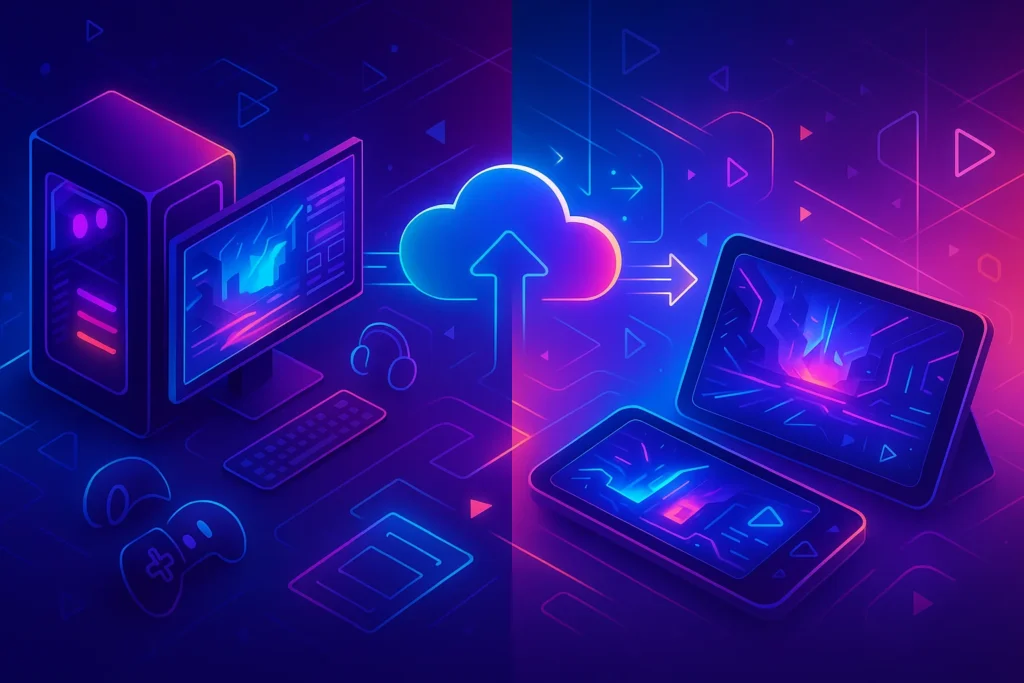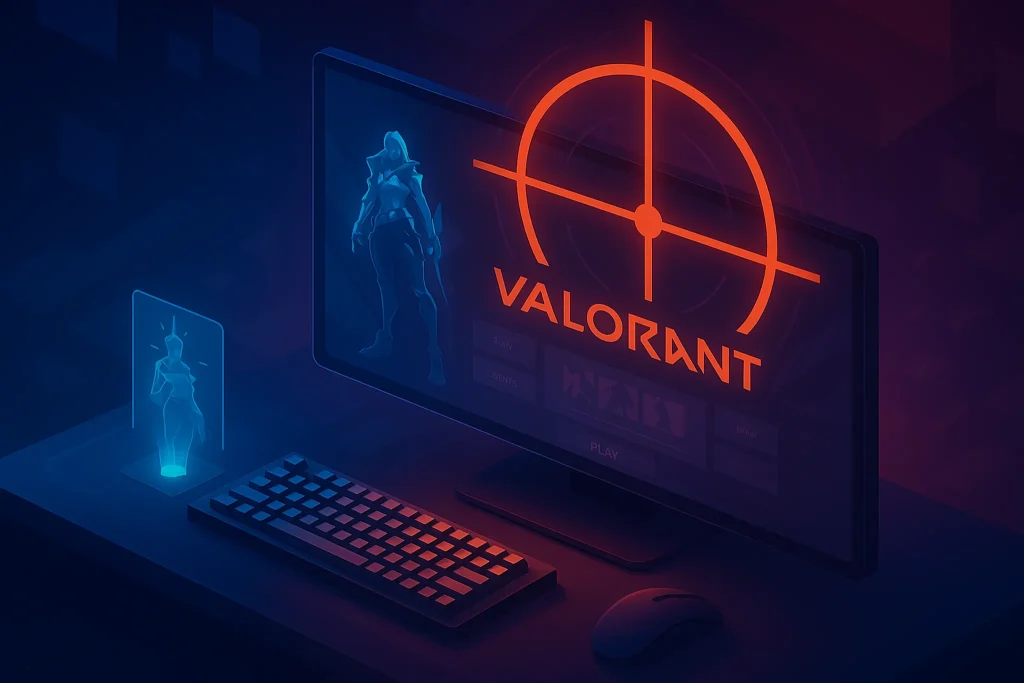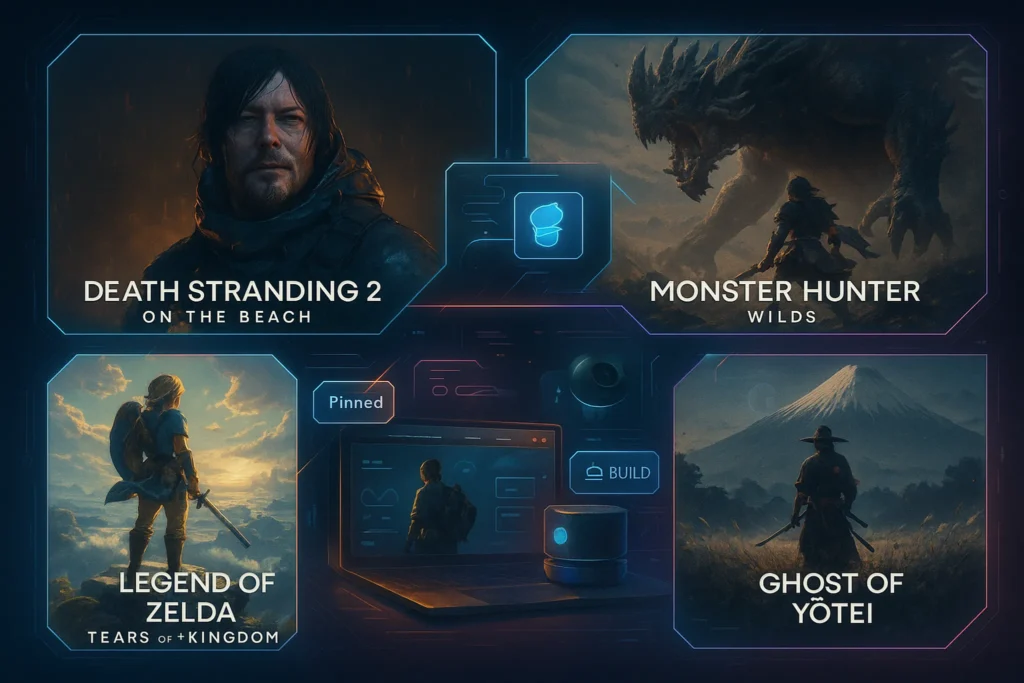Introduction: A New Era of Gaming
The question that dominated forums a decade ago—console or PC?—has evolved. In 2025, another contender stands in the ring: cloud gaming. Services like Xbox Game Pass Ultimate, NVIDIA GeForce NOW, and Boosteroid promise that you no longer need expensive rigs to enjoy cutting-edge titles. Instead, you stream games like you stream Netflix, turning a laptop, phone, or smart TV into a gaming machine.
But does the convenience of cloud streaming truly rival the raw power, flexibility, and ownership of a gaming PC? The answer depends on what kind of gamer you are, how you budget, and what you value in the experience. This guide breaks down the trade-offs across performance, cost, ownership, libraries, accessibility, and long-term value—helping you decide where your next dollar should go.
👉 For context, we’ve already compared Cloud Gaming vs Consoles: A Battle for the Future. Now, let’s pit the cloud against the PC.
Performance & Latency: Smooth vs Native
Performance is where PCs traditionally dominate. A well-built gaming rig delivers native frames with minimal latency. Whether you’re pushing 240Hz in Valorant or maxing out settings in Cyberpunk 2077, a PC gives you consistent, predictable performance tied to your hardware.
Cloud gaming, by contrast, introduces variables: your internet speed, server location, and congestion all affect input lag and image quality. On a fast connection (200Mbps+), cloud services can stream at 4K60 with HDR and ray tracing enabled. But the moment your Wi-Fi hiccups, compression artifacts and latency creep in, breaking immersion—especially in competitive games.
For casual or single-player gaming, the gap is closing. But if you play ranked matches where milliseconds matter, PCs still hold the crown.
👉 Looking for cost-efficient PC builds? Check out How to Build a Budget Gaming Setup Under $800.
Cost Over Time: Upfront Investment vs Subscription
A custom gaming PC costs anywhere from $800 to $2,000, depending on your ambitions. The upside is that it’s a one-time investment with upgrade flexibility. You own the hardware outright, and you can stretch a good rig for 4–6 years with occasional upgrades.
Cloud gaming flips that model. Subscriptions range from $10 to $20 per month, plus the cost of a controller or compatible device. That means you can access a high-end gaming experience for as little as $120 a year. But after five years, you may have spent $600–$1,000 without owning anything tangible.
There’s also the hidden cost of internet. To truly benefit from cloud gaming, you need fast, stable broadband. In regions where that’s expensive, cloud may not be as budget-friendly as it looks.
Ownership & Modding: Freedom vs Restrictions
PC gaming isn’t just about playing—it’s about tinkering. You can mod Skyrim until it feels like a new game, overclock your GPU, or run emulators for retro titles. That flexibility is part of PC culture.
Cloud gaming, however, locks you into curated ecosystems. You can’t install mods, can’t tweak performance profiles, and can’t run your own executables. For players who enjoy creativity and control, this feels restrictive.
That said, for gamers who simply want to “click and play,” the lack of modding isn’t a deal-breaker—it’s a relief. No troubleshooting, no driver conflicts, no upgrade anxiety.
Game Libraries: Infinite vs Curated
Steam alone boasts thousands of titles, with new releases daily. Add Epic, GOG, and itch.io, and the PC gaming library is effectively infinite. You buy games once, they’re yours forever (barring DRM). Combine that with mods, indie projects, and experimental builds, and PC gaming is unmatched in variety.
Cloud services, meanwhile, are closer to Netflix. You rent access to a rotating catalog curated by providers. Xbox Game Pass Ultimate is the strongest here, with day-one access to many blockbuster titles. GeForce NOW takes a hybrid approach, letting you stream games you already own on Steam or Epic. But the availability isn’t universal—some publishers still opt out.
👉 For more on library options in streaming, explore Best Cloud Gaming Services for Low-End PCs.
Accessibility: Any Screen, Anywhere vs Dedicated Setup
Cloud gaming’s greatest strength is accessibility. As long as you have an internet connection, you can start a session on your phone during lunch, pick it up on a laptop at night, and continue on a smart TV in bed. The hardware requirements are minimal, and updates happen invisibly in the cloud.
A PC setup, on the other hand, demands space, peripherals, and maintenance. It’s an immersive hub—but you can’t carry your rig to a café. Portable PCs like the Steam Deck OLED bridge the gap somewhat, but they still require investment and local hardware upkeep.
For nomadic or casual gamers, accessibility tilts heavily toward the cloud. For those who value immersion, the PC setup wins.
Upgrades & Longevity: Hardware vs Automatic
With PCs, upgrades are both a burden and a blessing. When new GPUs release, you can swap parts and stay current—but it costs time and money. A gaming PC from 2020 can still run modern games, but often at reduced settings unless upgraded.
Cloud gaming solves this with invisible upgrades. Providers refresh their server hardware regularly, meaning your $15/month subscription can suddenly deliver RTX 5090-level performance without you lifting a finger. You’re future-proofed as long as you stay subscribed.
But there’s a psychological angle: PC gamers own their progress, while cloud users rent it. For some, that distinction is everything.
Want More Gaming Deep Dives?
Join our free newsletter for in-depth comparisons, gaming setup tips, and cloud service reviews—so you always make the smartest play.
No hype. Just actionable insights.
100% privacy. No noise. Just value-packed gaming insights from NerdChips.
📊 Comparison Table: Cloud Gaming vs PC Gaming
| Feature | Cloud Gaming | PC Gaming | Winner |
|---|---|---|---|
| Performance | Dependent on internet; up to 4K, but variable | Native frames; stable and customizable | PC Gaming |
| Cost | $10–$20/month; no big upfront | $800–$2000 upfront; upgrades every few yrs | Tie (depends) |
| Ownership/Modding | Limited; no mods or tweaks | Full freedom; mods, emulation, custom rigs | PC Gaming |
| Game Libraries | Curated, rotating catalog | Virtually unlimited; permanent ownership | PC Gaming |
| Accessibility | Any device, anywhere | Dedicated hardware, limited portability | Cloud Gaming |
| Longevity/Upgrades | Automatic server upgrades | Manual upgrades, but ownership retained | Tie (depends) |
🎨 Checklist: Which Is Right for You?
-
If you’re a casual gamer who values flexibility, cloud gaming is ideal.
-
If you’re a competitive or modding enthusiast, PC gaming is the clear winner.
-
If you want the best of both worlds, consider a hybrid setup: a solid PC at home, with cloud gaming as a mobile backup.
💡 Nerd Tip: Hybrid gaming is underrated. Many players use PC at home for competitive sessions, but stream lighter titles through the cloud while traveling.
Environmental Impact: Power at Home vs Power in the Cloud 🌍
One often-overlooked angle when comparing cloud and PC gaming is energy consumption. A gaming PC with a modern GPU like the RTX 4080 can easily pull 350–600 watts during peak gaming sessions. Add in the CPU, monitor, and peripherals, and your setup may consume more than 700 watts per hour. Over time, that adds up—not just in electricity bills, but in environmental footprint.
Cloud gaming shifts that energy draw to massive data centers. On your end, the device doing the streaming—whether it’s a phone, tablet, or smart TV—consumes very little. That sounds efficient, but data centers are power-hungry. Cooling, networking, and high-density servers use megawatts daily. Some providers offset this with renewable energy pledges, but the reality is mixed depending on geography.
For eco-conscious gamers, the question becomes: is it greener to run your own efficient PC and upgrade parts over years, or rely on a subscription powered by industrial-scale data centers? The answer isn’t simple—but it’s worth acknowledging that both approaches have trade-offs.
Regional Availability & Infrastructure: Gaming is Local 🌐
Your experience with cloud gaming depends less on the service and more on where you live. In regions with robust fiber-optic internet, 5G coverage, and low latency, cloud gaming feels nearly seamless. Cities like Seoul, Tokyo, and parts of the U.S. and Europe are prime examples where you can stream 4K HDR titles with almost no hiccups.
But in countries where internet infrastructure lags, the story is different. Even with high download speeds, inconsistent latency or jitter ruins competitive play. Many gamers in emerging markets still find that a budget gaming PC offers more reliable performance than cloud solutions.
PC gaming, by contrast, works anywhere electricity is stable. You download the game, and performance is guaranteed by your hardware. This makes PC the more universal choice globally, while cloud gaming remains region-dependent for now.
Security & Privacy Considerations: Who Holds Your Data? 🔐
Gaming isn’t just about fun—it’s also about personal data. On a PC, your files, mods, and account credentials live locally. You control where they’re stored, how they’re backed up, and whether they’re shared.
Cloud gaming flips that model. Your gameplay sessions, preferences, and even save files live on remote servers. That means trusting providers with sensitive data. While major platforms like Microsoft (xCloud) and NVIDIA (GeForce NOW) invest heavily in security, risks remain: outages, account breaches, or even loss of access if licensing agreements change.
For players who want maximum privacy and ownership, PCs still provide peace of mind. For those comfortable with managed ecosystems, cloud gaming offers convenience but requires a degree of trust in providers.
Resale Value & Secondary Market: Tangible vs Intangible 💸
Another overlooked factor is resale potential. Gaming PCs and their components retain real-world value. A GPU bought today can often be resold in two or three years for a good portion of its price. CPUs, motherboards, and even cases hold some value in the second-hand market, offsetting upgrade costs.
Cloud subscriptions, however, leave nothing tangible behind. After years of monthly payments, you don’t own hardware you can sell or games you can pass on. Once you stop paying, the service stops.
This difference is especially relevant for gamers who see hardware as an investment. A well-built PC doesn’t just play games—it becomes a long-term asset with real resale options. Cloud gaming is a service, not an asset.
The Hybrid Future of Gaming: Best of Both Worlds 🔄
The real answer to “Cloud vs PC” may not be either/or—it may be both. Many gamers already adopt hybrid setups: a powerful PC at home for high-performance, modded, or competitive sessions, and cloud gaming as a portable backup.
Imagine playing Baldur’s Gate 3 on your PC at home, then continuing on your phone via xCloud while traveling. Or using GeForce NOW to test a demanding title before deciding to invest in a GPU upgrade. This dual approach offers flexibility and future-proofs your library.
Valve’s Steam Deck and ASUS ROG Ally also point toward this hybrid model. They’re portable PCs that can run games natively but also access cloud services for lighter or more mobile sessions.
👉 For a taste of how handhelds already blend the two worlds, see our Steam Deck OLED Review for Portable Gaming.
User Scenarios: Casual vs Pro Gamers 🎮
To truly decide between cloud and PC, it helps to imagine real user scenarios.
-
Casual Gamer: You play a few hours a week, mostly single-player or story-driven titles. You don’t care about mods, and your priority is low cost and high accessibility. Cloud gaming is perfect—you pay $15 a month and enjoy AAA titles on any device.
-
Competitive Gamer: You play shooters like Valorant, Apex, or CS2. Milliseconds matter. Mods and custom peripherals are part of your setup. A PC is essential for the stability and customization you need.
-
Frequent Traveler: You’re on the move constantly for work or study. You need gaming on phones, laptops, or tablets. Cloud gaming shines here, but pairing it with a compact PC or handheld gives you flexibility.
-
Content Creator/Streamer: You want to record, stream, and edit gameplay. PCs offer native capture, integration with OBS, and performance overhead. Cloud gaming isn’t reliable for production workflows—yet.
By aligning these scenarios with your lifestyle, the decision becomes less about specs and more about fit.
🧠 Nerd Verdict
Cloud gaming isn’t the “PC killer” some predict—it’s a parallel path. The cloud makes gaming more accessible than ever, opening doors for people who can’t afford a $1,500 rig. But PC gaming remains the gold standard for performance, ownership, and creativity.
The future likely isn’t about choosing one over the other. Instead, it’s about mixing both: a powerful PC when you’re at home, and the cloud as your portable safety net. In 2025, gamers don’t have to choose between power and convenience—they can finally have both.
❓ FAQ: Nerds Ask, We Answer
💬 Would You Bite?
If you had to choose today, would you rather own a gaming PC you control, or stream games from the cloud without the hassle of upgrades?



